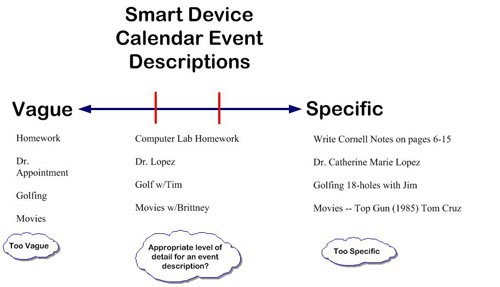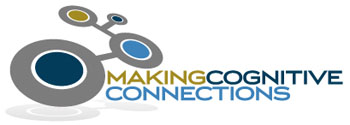The wording you choose for the Title or Event field in your calendar app may make the difference between keeping and missing an appointment. Whether you have an iOS, Android, or Windows device, name this field carefully.
A calendar app is one of the most beneficial programs available on smart devices. It allows the user to create a calendar appointment or event with any number of details, including:
- Appointment title
- Appointment time
- Appointment date
- Alert or reminder prior to the appointment
- Recurring appointments
- Notes related to appointment
All smart devices include a built-in calendar app; however, the functions and options they offer will vary from operating system to operating system (e.g., from iOS to Android to Windows) and from device to device (e.g., different Android devices).
Title or Event field
We will address several of the calendar’s fields over a series of articles. The focus here is on giving your appointment a smart name or label, i.e., one you’ll recognize when it comes due. The name of this appointment “label” field may vary, based on the device used:
- iOS devices (iPod Touch, iPhone, iPad) use the term Title for the appointment label.
- Some Android devices use the term Event, while others use the term Title for the appointment label.
Name the appointment strategically
You might be wondering, “What’s the big deal about entering the name of the appointment?” My experience suggests that individuals with TBI (traumatic brain injury) often choose an ineffective label for the appointment. The graphic organizer below suggests that appointment names can be too vague (e.g., “Dr. appointment”) or too specific or detailed (e.g., “Dr. Catherine Marie Lopez appointment”).

Title or Event names that are too vague can lead to missed appointments, unnecessary phone calls, or other unwanted results. For example, an appointment labeled “Dr. appointment” is probably too vague to be useful by the time the scheduled appointment rolls around. At the time you made it, entering “Dr. appointment” made perfect sense; after all, you had just gotten off the phone with a particular doctor’s office. Unfortunately, two weeks later when the appointment reminder appears and says “Dr. appointment,” you may find yourself asking, “Uh oh, which doctor?!?”
On the other hand, entering “Dr. Catherine Marie Lopez appointment” is probably TMI (too much information). First, unless you see more than one Dr. Lopez, it isn’t necessary to enter the doctor’s full name. Second, the word “appointment” is redundant; everything in your calendar is an appointment of some kind. If you enter more information than necessary, it takes too long and ultimately frustrates you, the scheduling assistant at the doctor’s office who’s waiting for you to finish, etc. In this case, a Title or Event labeled simply “Dr. Lopez” should do the trick; it tells you which doctor, but doesn’t tell you any more than you need to know.
In the end, each user must find the appropriate level of detail for each event. You want one that will provide just enough information—not too much, and nothing irrelevant or redundant. I have my students work on a legend of abbreviations that they learn to use to expedite their entry of information. For instance, most people could enter “Dr. Lopez” in place of “Doctor Lopez.” These may not seem that different from one another, but if you have trouble finding or hitting the right letters on a keyboard, it can make the difference between continuing to use the device and getting so frustrated that you stop using it.
So take care when filling in your calendar app’s Title or Event field so that you can successfully schedule—and keep—appointments. The detail level will vary from person to person and will typically require some trial and error as each user determines what works best for him or her. The role of the professional is in assisting the individual with TBI to identify appropriate appointment descriptions and in assessing the individual’s level of success as appointments come due.
